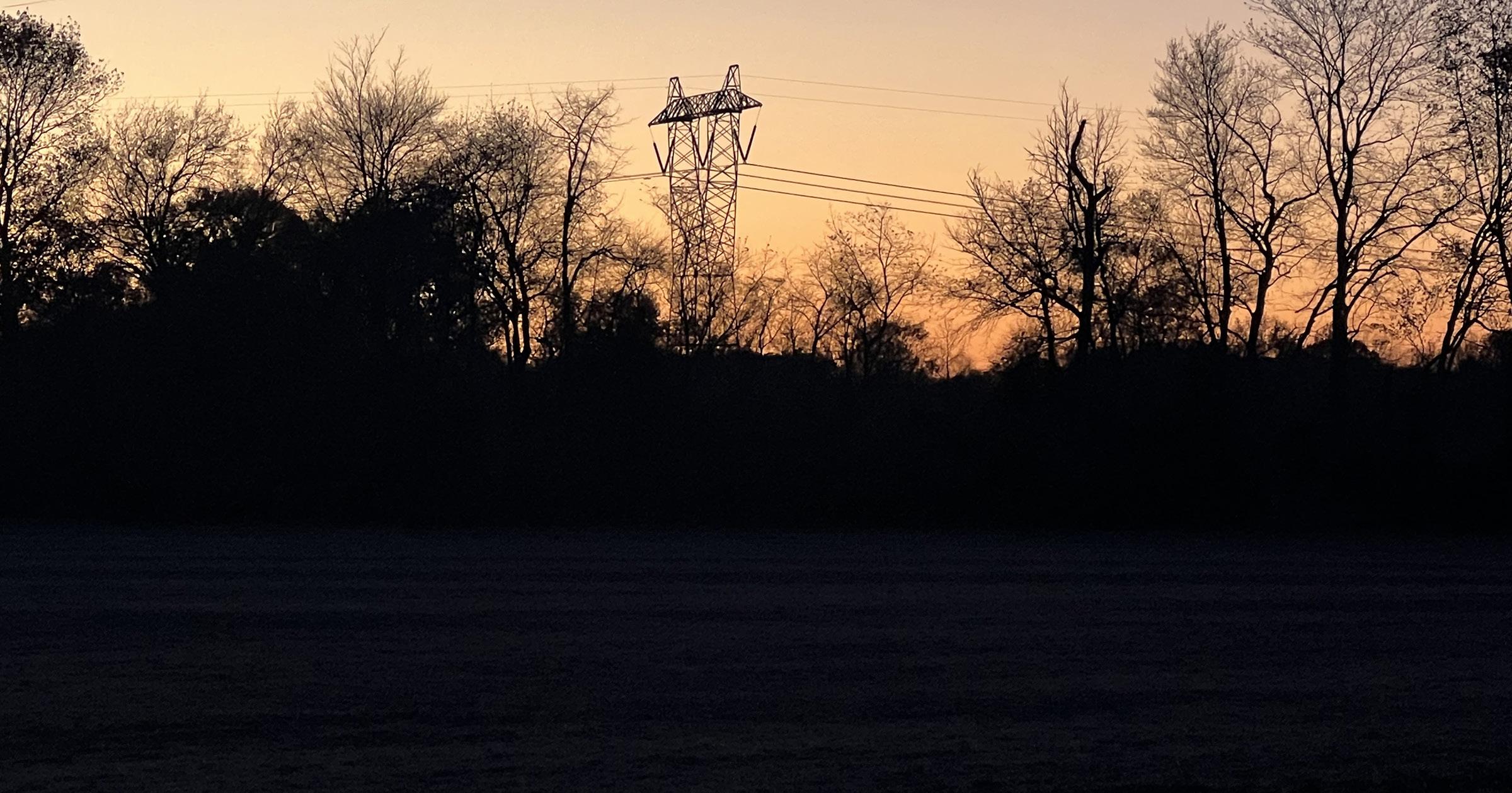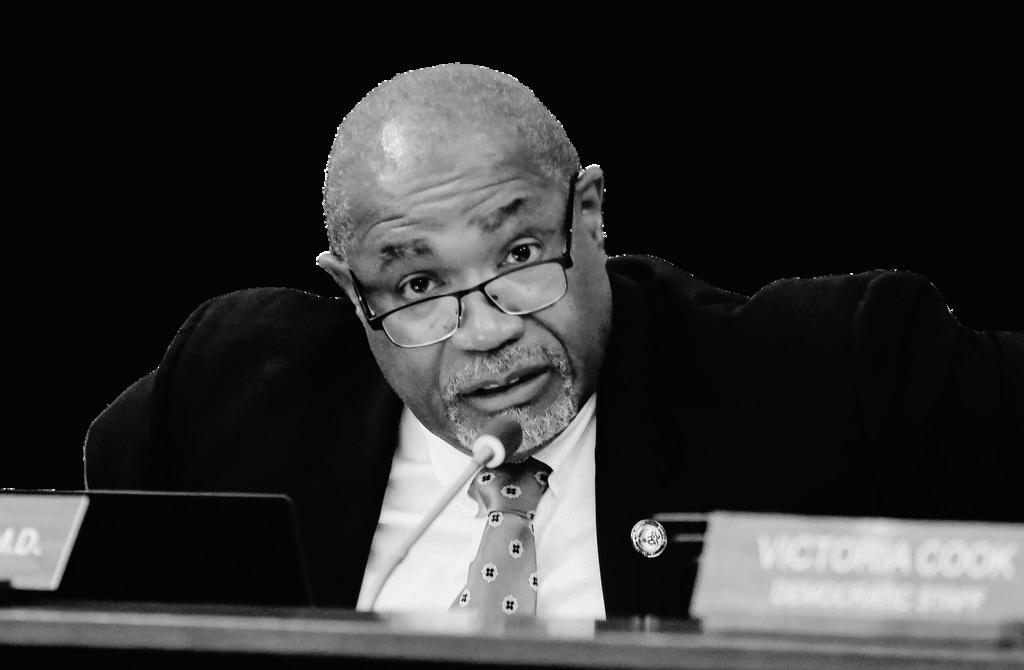










Pair of Complaints Lodged Against RCBC’s President Gives Way to ‘Investigation’ College President Contends Charges Are ‘Manufactured’ as Allegations Surface About Area Law Firm’s Involvement as Well as Nepotism Claims
By Douglas D. Melegari
Staff Writer
MOUNT
HOLLY—The seven-year president of Rowan College at Burlington County (RCBC), Dr. Michael A. Cioce, is said to be facing allegations of misconduct that have resulted in the RCBC Board of Trustees ordering on Oct. 22 an “investigation” by an outside legal firm.
Cioce’s lawyer, however, former Burlington County Prosecutor Scott Coffina, dismisses the allegations, contending the college president is merely being accused of a “nonsensical technical violation” of state education code pertaining to a matter the board had previously approved.
By Douglas D. Melegari
Staff Writer
PEMBERTON BOROUGH—New public policy decisions undertaken by both “Trenton” and “Washington” D.C. requiring both offshore wind and electric vehicle conversion are leading to soaring electricity bills for residents throughout the state, including in the Pinelands, warned Brian Vayda, executive director at the Public Power Association of New Jersey, during an appearance in the Pinelands, making a presentation at the Oct. 21 Pemberton
Borough Council meeting.
Vayda’s attendance at the borough council session was two fold, first because the borough, unlike other area municipalities, has its own utility department supplying municipal residents with electric service and borrows electricity at wholesale through a consortium, and therefore the borough works directly with the association, and second, because the borough doesn’t rely on one of the state’s four major public utility companies directly, to be the “bearer of some bad news.”
But as Vayda made clear during his
presentation, while he was attending a meeting in the borough to make an announcement specific to the municipality, the rising energy costs he was about to detail, “does not just impact the Borough of Pemberton, it impacts 65 million people in 13 or 14 states,” including New Jersey, which are part of the PJM Interconnection regional transmission organization, that coordinates the movement of wholesale electricity.
Vayda’s remarks come as numerous residents throughout South Jersey have See ENERGY/ Page 5
But the prospect that they are somehow trumped-up, “manufactured” charges against the college president, which have arisen out of a feud involving a college vendor, the legal firm of MalamutLaw, one of whose attorneys, Kelly Grant, serves as board solicitor and another, Evan H.C. Crook, as labor counsel for the college, resulted in acrimony that led to a fiery Oct. 22 meeting of the board.
The Pine Barrens Tribune has since learned that in the months preceding the pair of complaints, Cioce purportedly found himself having to push back against alleged
‘Switched’
‘No Merit,’ ‘Unfounded,’
By D ouglas D. M elegari Staff Writer
TABERNACLE—A social media post by a Pinelands resident that has attracted widespread attention online with some 85 shares on Facebook (with that post also screenshotted by the public and shared elsewhere throughout social media groups in the state) alleging that on the first day of early voting, Oct. 26, a couple went to the early voting polls in Tabernacle Township and the husband’s “vote was switched,” and “when he reported it, they said he was the 4th person today” to report such an alleged issue, has “no merit whatsoever” and has been deemed “unfounded” by the Burlington County Board of Elections, county spokesman David Levinsky repeatedly told the Pine Barrens Tribune in an Oct. 27 phone interview.
Levinsky’s phone call followed this newspaper inquiring about that report, in combination with another from the same day, from a separate party, that has also been circulating on Facebook, in which a voter who also reported to have voted in Tabernacle described that while “standing in line, the man in front of me said double check your vote,” alleging that his vote for his presidential candidate selection “switched automatically” from Former President Donald J. Trump to Vice President Kamala Harris.
The former social media post urged voters to “make sure you check your ballot when it prints out,” while the latter pleaded with voters to “please double check your choice before you print it!”
Levinsky, in repeatedly casting doubts about the validity of the online reports to this reporter, described that “ballots are not cast until they are put in a tabulator,” and the tabulated votes cannot be counted until Election Day.
Instead, he maintained, through the relatively new, current process the county has implemented for early voting (and what will also be used this year for the first time for inperson voting on ‘Election Day’ itself), voters are first asked to use what is called a “ballotmarking device” to “just mark your ballot.”
A ballot, he explained of the device, “comes up on a touchscreen” in which voters can “mark it,” and then they are specifically “instructed to review” their selections “before printing.”
Then, Levinsky further explained, the ballot prints and voters “now have a paper ballot” that they can “review again,” and voters are urged to review it once more at that point in the process.
It is at that point, according to Levinsky, that a voter can take the printed ballot to a
See VOTES/ Page 15














LESS TAXES for all





PRO BUSINESS- Cut regulations, increase private sector jobs, increase revenue generation
LESS TAXES for all
Cut regulations, increase private sector jobs, increase revenue generation
LESS TAXES for all
STOP Illegal Immigration
STOP Illegal Immigration
PRO BUSINESS - Cut regulations, increase private sector jobs, increase revenue generation
PRO BUSINESS- Cut regulations, increase private sector jobs, increase revenue generation
STOP Illegal Immigration
END Catch & Release; STRONG on Border Security, End Drug Trafficking
STOP Illegal Immigration
END Catch & Release; STRONG on Border Security, End Drug Trafficking
END Catch & Release; STRONG on Border Security, End Drug Trafficking
For PATIENT-CENTRIC Healthcare, not Profit-Centric
For PATIENT-CENTRIC Healthcare, not Profit-Centric
RESTORE Patient-Doctor relationship
END Catch & Release; STRONG on Border Security, End Drug Trafficking
For PATIENT-CENTRIC Healthcare, not Profit-Centric
RESTORE Patient-Doctor relationship
For PATIENT-CENTRIC Healthcare, not Profit-Centric
RESTORE Patient-Doctor relationship
PROTECT Women’s Health and Doctors providing medical care, birth control and IVF from Govt and insurance interference
PROTECT Women’s Health and Doctors providing medical care, birth control and IVF from Govt and insurance interference
RESTORE Patient-Doctor relationship
PROTECT Women's Health and Doctors providing medical care, birth control and IVF from Govt and insurance interference
PROTECT Parental Rights
PROTECT Parental Rights
PROTECT Parental Rights
PROTECT Medicare and Social Security
PROTECT Medicare and Social Security
PROTECT Women’s Health and Doctors providing medical care, birth control and IVF from Govt and insurance interference
PROTECT Medicare and Social Security
PROTECT Parental Rights
Cut bureaucracy in mental and physical health of VETERANS
Cut bureaucracy in mental and physical health of VETERANS
Cut bureaucracy in mental and physical health of VETERANS
PROTECT Medicare and Social Security
STRONG against Antisemitism
STRONG against Antisemitism
STRONG against Antisemitism
Cut bureaucracy in mental and physical health of VETERANS
STRONG against Antisemitism
VOTED to increase taxes in NJ
VOTED to increase taxes in NJ
VOTED to increase taxes in NJ
VOTED to increase property taxes
VOTED to increase property taxes
VOTED to increase property taxes


INCREASED regulations, drove businesses out of NJ
VOTED to increase taxes in NJ
INCREASED regulations, drove businesses out of NJ
INCREASED regulations, drove businesses out of NJ
WEAK on Illegal Immigration
WEAK on Illegal Immigration
WEAK on Illegal Immigration
WEAK on Border Security
VOTED to increase property taxes
WEAK on Border Security
WEAK on Border Security
WEAK against Profit-Centric healthcare
INCREASED regulations, drove businesses out of NJ
WEAK against Profit-Centric healthcare
WEAK on Illegal Immigration
VOTED for Govt infringement on Parental Rights
WEAK against Profit-Centric healthcare
VOTED for Govt infringement on Parental Rights
WEAK on Border Security
VOTED for Govt infringement on Parental Rights
WEAK against Govt and insurance interference in medical care, birth control and IVF for Women
WEAK against Profit-Centric healthcare
WEAK against Antisemitism
WEAK against Govt and insurance interference in medical care, birth control and IVF for Women
WEAK against Govt and insurance interference in medical care, birth control and IVF for Women
VOTED for Govt infringement on Parental Rights
WEAK against Antisemitism
WEAK against Antisemitism
WEAK against Govt and insurance interference in

Harry J. Harper and Matthew Bianchini (Perry Doyle not pictured), followed by Democrats Leslie Kanfer, Frank Dickey, and Gaye Burton.
By D ouglas D. M elegari Staff Writer
PEMBERTON—Party control of Pemberton Township Council is up for grabs in Tuesday’s Nov. 5 General Election, with Republicans hoping to gain control of the public body for the first time since 2002, in what is this area’s most competitive municipal race of the election cycle.
Three Republicans, Matthew Bianchini, Perry Doyle, Jr., and Harry J. Harper are hoping to take three open seats on the council being given up by current Democratic Councilmembers Paul Detrick, Donovan Gardner and Elisabeth McCartney, all while Democrats Gaye Burton, Frank Dickey, and Leslie Kanfer hope to keep the seats in Democratic hands. Whoever wins this election will join with Republicans Dan Dewey and Joshua Ward on the five-member council in 2025.
Five of the six local candidates attended an annual candidate’s forum hosted by the Browns Mills Improvement Association (BMIA) on Oct. 27. (Doyle wanted readers to know that he had a pre-scheduled trip to Montana with his father that he booked back in February, and the invite for the forum came in August, at which point he was not in a position to cancel the trip, emphasizing he believed it was important to spend time with his father because of his age.)
“This ensures that every voice is heard and allows for a fair comparison of their views,” declared BMIA President Marti Graf Wenger of the event.
Matthew Bianchini:
A resident of Pemberton Township since 1993, and a 37-year U.S. Air Force veteran, Bianchini currently works in a “civilian capacity” with the U.S. Departments of Defense and Veterans Affairs, “working on various undercover contracting activities for pharmaceutical companies.”
The “overdevelopment” of the town, he maintained, is part of a direction “I don’t necessarily agree with.”
“Not that I am against development, I just
think we need to develop smartly,” Bianchini declared. “And what I currently stand for is I believe we need to take a pause in our current development and really look at where we are heading, and the way we are heading.
“I think the way we approach the different development projects that are currently in the process isn't the right way. Not that I know of a perfect way, and I don’t make any promises, but I think there is a better way to do it.”
He added that “listening to the township residents” is “something I don’t really believe the current administration does.”
Harry J. Harper:
Having spent 48 years in the construction industry, Harper said he moved to the township four years ago because “my wife and I liked this little, nice, quiet town.”
“Some of the things I am against include the development, like the warehouse development that we have going on,” he said.
Harper said he would like to see the “town stay the way it is” and “revitalize the downtown areas.”
“I think we can do that, and still keep the small town alive here,” he declared.
Gaye Burton:
A retired schoolteacher and former Democratic council president hoping to regain a seat on council, Burton, a 24-year resident of the township originally from New York City, said she moved to Pemberton “to show my children a different side of the city life.”
“So, I wanted them to see a slow pace in the environment and just how things are so much more beautiful when you have some violence around you,” Burton asserted.
Burton said of her decision to run again for elected office, “I want to continue to support the township and the residents’ needs” and “I want to embrace policies and programs that helps us have a better quality of life for the residents here in Pemberton Township.”
“We have to listen to everyone,” she said. “Everyone has their own concerns, cares, wants and needs. But at the end of the day, we are voting together to take care of the entire township – not just a group of people, but the entire township. And sometimes, we have to make decisions that everyone might
As the winter season approaches, your home transforms into a cozy retreat adorned with festive and inviting decor. Watch for these 2024 winter decor trends.


• Gemstone hues. Deep shades like emerald green, sapphire blue, ruby red and amethyst purple are all the rage this Christmas. These colors bring opulence and warmth to your space. Pair them with metallic accents for a bold statement.
• Alternative Christmas trees. For a unique twist on the traditional Christmas tree, try a wall-mounted tree shape made of fairy lights or stack books or wooden pallets into a pine-shaped pyramid. Let your imagination run wild!
• Glass decor. Fill vases and bowls with ornaments, lights or greenery for stunning centerpieces. Their transparency allows

enhancing your holiday decor.
• Minimalist chic. Embrace simple, clean lines with minimalistic decorations. Think sleek candle holders, understated wreaths and subtle tree ornaments that make a strong impact without overwhelming the space.
• Handmade. Support local artisans by incorporating handcrafted items into your holiday decor. These unique pieces often have a story behind them and make excellent conversation starters.
How will you create a stylish and inviting winter haven?
8 WEEKS AWAY! Christmas is





By Bill B onvie Staff Writer
BASS RIVER—Back in early September, the question of just how many of the citations given out in Bass River Township by the New Jersey State Police were issued on local roads, as compared to the section of the Garden State Parkway that traverses this rural community with an exit ramp into the Village of New Gretna, was one that Mayor William “Rick” Adams promised to attempt to have answered.
At the subsequent meeting of the Bass River Commission on Oct. 15, however, it was revealed that no one can provide an answer to that question.
“There is no way that information is available to us,” reported Commissioner Jane Allen, who is temporarily filling the post left vacant by the resignation of former Commissioner Nicholas Capriglione back in May (and who is a candidate for it in the Nov. 5 election, opposed by former write-in candidate Dan Sikora).
That is because the Troopers do not separate the two venues when they write tickets—something that would require the entire system to be revamped in order to do it.
“So, we can’t determine at this time what is local and what is the Parkway,” she said.
The question arose in the course of a lively discussion at the previous session over whether the number of traffic tickets written
(Continued from Page 1)
reportedly tried to make sense of recent sizable rate increases that they have observed in paying their electric bills, sometimes getting few answers in calling their local power company or the New Jersey Board of Public Utilities (BPU).
According to Vayda, “there are three components to a wholesale electricity bill that the borrower is subject to.”
The first is “energy,” which he defined as the “actual commodity consumed by the end-users, which comes from natural gas, coal, nuclear, and renewable sources, so on and so forth.”
The second component is “transmission,” which he defined as the “cost of the highvoltage power lines that are used to transmit the energy to your distribution system.”
And the third component, he said, is “capacity,” which he explained is “basically iron in the ground” or “having enough generation online, in the worst times of the year,” such as when the “hottest times of the year” occur.
“Currently, as it stands, for the Borough of Pemberton, when we break down the wholesale power source, about 54 percent of your cost right now comes from the energy component,” Vayda pointed out. “15 percent, right now, comes from capacity. … The next component is transmission, and right now, about 22 percent of your bill is based on transmission. … So right now, about 37 percent of your electric costs are based on capacity and transmission.”
Vayda then asserted “here is where the bad news comes in,” before detailing that “unfortunately, beginning on June 1, 2025, we are going to have to flip that dynamic.”
And under the new dynamic, he explained,
in Bass River was excessive, with one resident saying he felt as though he was living in a “police state.”
Another matter that Adams said he would look into at the Oct. 15 meeting was that of why certain properties in the township had been listed as having no value, meaning that they are not subject to local property taxes.
“It was brought to our attention that we have got property in New Gretna that was assessed at no value,” noted Deputy Mayor Louis Bourguignon in his monthly report. “Any property in New Gretna should be assessed at something.”
He contended that should be the case even if it is in the meadowlands and thus not suitable for any sort of development, and he couldn’t understand why any piece of property wouldn’t have some value assigned to it.
When asked whether he had any update to provide on Oct. 29, Adams responded that he had “to sit down and find out exactly what is going on with these properties that are listed at no value” and “would have to talk to our tax assessor about the issue,” adding that even tracts of land in the meadows with which you can’t do anything go for about $1,000 an acre.
“I can’t see any property belonging to residents not having any assessed value,” the mayor declared, echoing Bourguignon’s sentiments on the subject. “But I will definitely get to the bottom of it.”
“38 percent of your costs will be based on energy commodity, and then 40 percent will be based on capacity, and 15 percent will be based on transmission.”
The borough’s electricity is fed by the grid of Jersey Central Power and Light (JCP&L), Vayda noted, and given the current dynamic, the borough’s “obligation” is based on “JCP&L’s five highest peaks.”
Under the new dynamic, according to Vayda, “it is going to flip” to where “55 percent of your electric costs are going to be based on the 10 critical hours.”
Vayda then proclaimed, “What we are looking at is a 40 percent increase in your total costs for the borough starting June 1, 2025.”
The association, according to Vayda, “purchases our energy commodity” and through at least 2029, it expects to “purchase a majority of that” at a “fixed” rate.
However, the electricity supplied to the borough “all runs through the transmission systems” of JCP&L, “and unfortunately, we are starting to see increases every year in transmission.”
“And one of the reasons that we see transmission increasing is the New Jersey BPU just awarded $1.1 billion in offshore wind transmission,” Vayda revealed.
So, how are the offshore wind projects proposed potentially detrimental to the consumer? Vayda offered the clearest explanation this newspaper has heard to date.
Essentially, he said, “They are building transmission to get it onshore,” and there is a cost to build that infrastructure, and “that $1.1 billion is going to be spread over everyone in the state.”
“So, everyone in the state is going to see an increase in transmission,” Vayda declared.
However, “the big increase,” advised Vayda, is “going to come from the capacity.”
In response to a question about how it had come up, Adams said, “It was somebody that was looking through the tax rolls and found it and brought it to my attention.” He added that he believed there were “three or four” parcels of land so designated.
Solicitor Joanne O’Connor reported that at the specific request of Susan Grogan, executive director of the Pinelands Commission, the locations in the township where cannabis may be cultivated (so far, two applications to do so have been made) along with the site of the single retail location that has been approved for its sale, would not be specified until the zoning ordinance has been revised, at which time those locales could be added.
The ordinance that allowed for the cultivation of cannabis in the township was adopted by the Board of Commissioners in August of 2021 following a special meeting of residents conducted the previous April. Then in the following year, the ordinance was revised to include the solitary retail establishment.
Noting that a lot of investment people have been reaching out trying to determine which municipality will offer the most economic benefit to cannabis growers and retailers, she said, “I give them all the information, and they rarely follow up.” She said she planned to meet with Planning Board Attorney Chris Norman to iron out the details of the ordinance revision.
Adams, however, who took office earlier this year, subsequently told this newspaper that he was personally opposed to the retailing of cannabis in Bass River, “especially in the center of our town,” and planned to raise an objection to any such operation opening while he is mayor.
In other business, the commissioners unanimously approved a resolution allowing
In the case of the borough, it pays $56 a megawatt day for capacity, but beginning in June 2025, “that cost is going to soar to $270 a megawatt day.”
“And the spike in these capacity prices are driven – and this is kind of a fact that no one is debating, by fossil fuel power plants that are being forced to retire,” Vayda revealed.
More specifically, he maintained, “there are public policy decisions that are being made in Trenton, and being made in Washington, that are forcing a lot of the fossil fuel, natural gas and coal plants offline,” but “unfortunately, it (green infrastructure) is not being built fast enough, or to enough of a scale, to compensate for what we are losing right now, as far as from the fossil power plants.”
New Jersey Democratic Governor Phil Murphy recently enacted a new regulation that completely prohibits the sale of new gaspowered vehicles beginning in the 2035 model year, and requiring nearly half of all new cars sold to be electric starting in 2026.
But public policy decisions, such as those mandating electric vehicles (EVs), Vayda explained, are resulting in an “increase in demand” and “the grid is not ready to handle this type of change so quickly,” with “change,” he emphasized, “the key word here.”
That is on top, according to Vayda, of an increase in “data centers” (which are used to power Artificial Intelligence [AI]).
“We are also seeing increased load, we are seeing increased usage across the board,” Vayda revealed. “We are seeing data centers pop up everywhere, and they are big load drops. They are popping up across the state … they are popping up everywhere, and we are all part of this one big grid. So, what we are seeing is a decrease in supply and an increase in demand. And if anyone knows economics, you see that
for the insertion of “a special item of revenue and appropriation” from the New Jersey Department of Transportation Municipal Aid Fund representing awards of $270,000 and $181,070 for fiscal years 2022 and 2023, respectively, in the 2024 municipal budget.
Bourguignon also emphasized that some initial confusion created by the temporary closing of the bridge into Washington Township on County Route 542, and concerns about emergency vehicle crews not being able to find their destinations in a timely manner, had been resolved in a meeting between by Fire Chief Thomas Wetmore and Burlington County Public Works Director Joseph Brickley, who arranged for the relocation of strategic signage in the immediate area.
Not everyone, however, was pleased with the arrangement.
“How did they get away with closing that bridge?” asked resident Howard Rothchild, who wanted to know why one lane couldn’t have been left open while necessary repairs are made.
On a lighter note, Adams reported that the township’s “Scarecrow Challenge” had more than 200 entries created by residents.
“It is the most I’ve seen the town come together,” he said, adding that “other towns have notified us they’re going to steal our idea next year.”
The mayor also gave special recognition to three residents, Carol Bitzberger, Diana Naylor and Theresa Cramer, for their contributions in organizing and publicizing the effort. The success of the campaign, in fact, has spurred plans for a “wreath challenge” to be held this December, he said, adding, “lights are great, but some people can’t afford the electricity.”
the curve shifts, and you are going to have higher prices. And that is what we are seeing.”
A question from Pemberton Borough Councilman Steven Fenster about a solar energy chart and a depicted “solar curve” also caused Vayda to reveal that in terms of solar panel generation, there is a disparity, “as most peak times of usage happen around 5 or 6 p.m., when solar is already on its down swing,” as that form of energy production yields “its highest contribution around 2 or 3 p.m., when the sun is the sharpest and the highest.”
The $250,000 increase in the capacity components to the borough, starting on July 1, 2025, is “not the only bad news,” Vayda maintained, but “the potential is for that price to rise to $695 a megawatt day” for capacity, “which would mean the borough would see another $500,000 increase in their costs starting June 1, 2026.”
That “worse-case scenario” assessment, as the executive director of the state power association put it, is based on a report by Morgan Stanley from “about three weeks ago” that he said described a “worsening supplydemand imbalance” that is “happening with all these power plants retiring” and the replacement sources “not getting built quick enough or to scale enough.”
“Unfortunately, that is the reality of the market that we face,” Vayda declared. “Costs are increasing everywhere.”
At one point, Pemberton Borough Councilwoman Diane Fanucci asked Vayda to give his “gut feeling” as to a 2026 figure that isn’t representative of the indicated worst-case scenario, to which he said the “broker market is right around $360 a megawatt day.”
“So, in 2023, there were about 180,000 megawatts of generation, and that was comprised See ENERGY/ Page 6
(Continued from Page 5)
primarily of coal, natural gas, and wind,” Vayda said. “Fast forward to 2024 – we lost about 30,000 or 40,000 megawatts of natural gas. So, when you look at your costs in 2022, they were $50, now all of a sudden, they are at $270,000, and we lost 30,000, or 40,000 megawatts of coal, which is possibly not coming back.
“They are trying to replace it with solar and wind. However, the ratio is, you need about 3 megawatts of solar to give you the equivalent of 1 megawatt of natural gas. So, you have to pepper every hole everywhere with solar in order to make a surplus of natural gas.”
Vayda declared PJM is simply “trying to get there,” but “it is going to take a long time and it is expensive.”
When a resident, in response, asked, “So, adding fossil fuels, is it a good thing?” the executive director of the power association responded, “I would say it has been a good thing for costs.”
He noted that a “really big build of natural gas in the State of New Jersey, in all of PJM” had “kind of flatlined prices for several years.”
“And now that we see a lot of retirements, we see increases in prices,” Vayda asserted.
One thing that Vayda repeatedly emphasized in describing the rising cost and reasons behind it is that it “does not just impact the Borough of Pemberton, it impacts 65 million people in 13 or 14 states.”
“I just saw, as a matter of fact, in Maryland, they just came out and said they are going to have to increase their rates by about 30 or 40 percent across the state because of this dynamic that we are seeing,” the executive director of the state power association pointed out.
So, what can residents residing in Pemberton Borough do to help curb costs for the municipality?
“If any residents can reduce their peak, if we reduce demand during those times, it directly helps the borough,” Vayda said.
And as electric vehicles become more prevalent, he said, “if they can kind of stagger their charging and not charge at their peak hour, all of this helps the community, right, because the 10 hours is not necessarily a daily thing.”
(As Vayda later explained it, in response to a question from Pemberton Borough Councilwoman Melissa Tettemer, transmission for the borough is based on the five highest hours when the whole JCP&L zone is hitting its peak, and what Pemberton’s contribution is to that, and the capacity is based on the five highest hours when the whole PJM system is hitting its peak – so those two combined are 10 hours.)
Vayda also revealed that the association is preparing for the possibility that electric vehicle charging may actually create a shift in peak usage, with him pointing out, in respect to peaks, “As a matter of fact, it has always happened in the summer.”
“One of the things we are seeing is with electric vehicles coming in, and home electrification, we see potential peak shifting in the winter, just because of when people are charging their vehicles,” he proclaimed.
“So, what is the suggestion(s) for the town to reduce peak transmission?” asked Fanucci of Vayda.
One possibility, the executive director of the state power association answered, is for the municipality to put out an “alert” a day before a peak is anticipated, such as the day before a heat wave, with it potentially pointing to a certain time range where it is known usage will be high and asking for avoidance then.
“Roughly, the borough has a 3-megawatt peak,” Vayda added. “So, every megawatt the
borough would reduce their peak by would directly save $200,000. But a megawatt is a big thing.”
Fanucci, in light of that response, questioned whether the borough should have “peak-and-off-peak pricing.”
“So, yes, that is one of the strategies that other towns are actually looking at implementing to dissuade people from using power during peak times,” Vayda said. “I have seen instances where they make the peak costs really expensive, and then the off-peak costs really cheap.”
Such a pricing structure, he added, “is “absolutely an option” and “incentivizes people” to curb power usage during times of peak demand.
Another possibility that Vayda said he has seen towns implement are “demand response programs” in which “they give away gift cards or whatever it might be.” But in order to put such a program in place, he added, the borough would have to have smart meters “because it has to be measured that you are actually reducing your usage during the peak periods.”
Vayda revealed that some towns are also encouraging homeowners to install “Nest Thermostats,” in which they “can actually enroll in a program where your thermostat will automatically be reduced over the internet.”
“The only thing I can say is if everyone pitches in, the costs to the borough will go down,” Vayda asserted. “You might not see it directly, but you will see it indirectly. Everyone will see reduced bills.”
But one resident immediately shot back he is “totally against smart meters,” maintaining they simply give control to the utility companies or the “government,” or even a person whom the residents know nothing about, to “shut you off if they decide there is a reason they want to shut you off.”
“They can drown you out,” the man declared.

“They can do whatever they want to do.”
Vayda responded that he would “disagree with that statement,” but acknowledged “yes, there are ways to control” from afar with at least smart thermostat technology.
The man then asked if there is any kind of “relief” in sight from what he called “insane” orders being issued, to which Vayda responded, that it takes “three to five years” to get any power source to be built out sufficiently, and in light of that not happening right now as demand increases all while plants go offline, warning, “We are getting beyond the point of no return.”
The BPU, in recent press releases, however, has quoted the governor in pushing for more electric vehicle programs that, “My administration continues to prioritize lowering emissions and improving air quality in our communities, no matter the zip code, by making EVs more affordable and accessible to all.”
NJBPU President Christine Guhl-Sadovy has also talked about her hopes for citizens to “reap the environmental and economic benefits of clean transportation.”
There was also, in the recent release, statistics given, including that “more than 37,000 EV incentives and more than 6,900 EV charger incentives have been approved” through a program called, “Charge Up New Jersey,” and as of June 30, 2024, “there were nearly 184,000 EVs registered in the Garden State, where EVs accounted for 2.6 percent of total registered vehicles and 11.6 percent of new vehicle sales in March 2024.”
The BPU, also in its recent messaging, claims that installing “high-efficiency or renewable energy technologies,” thereby “reduces energy usage, lowering customers’ energy bills and reduces environmental impacts.”
See ENERGY/ Page 19


NOTICE TO BIDDERS BOROUGH OF WRIGHTSTOWN COUNTY OF BURLINGTON
NOTICE IS HEREBY GIVEN that sealed bids will be received by the Borough Clerk for the Borough of Wrightstown, County of Burlington, State of New Jersey on November 27, 2024, at 11:00 AM prevailing time, at the Wrightstown Borough Hall, 21 Saylors Pond Rd., Wrightstown, NJ 08562, at which time and place bids will be opened and read in public for: Reconstruction of East Main St. and Railroad Ave. The Borough encourages prospective bidders to submit their sealed proposals prior to November 27, 2024, via certified mail or overnight delivery along with requiring a signature. The Borough is not responsible for bids which are sent for delivery and not received by a Borough employee.
Specifications and other bid information may be obtained at Kluk Consultants, LLC, 2 Eastwick Drive, Suite 202, Gibbsboro, NJ 08026. tel. (856) 566-0013, Monday through Friday between the hours of 8:00AM and 5:00 PM. Please call prior to arrival.
Copies of specifications may be obtained upon payment of a non-refundable fee of two hundred dollars ($200.00) per set. No digital copies of the specifications are available for purchase. A fifty-dollar ($50.00) fee is required if mailing of the documents is desired or by providing an additional FedEx Account Number. Mailed checks must include a request for documents with the name of the requested solicitation, as well as the Company Name, Mailing Address, Telephone & Facsimile Numbers as well as the Contact Person’s Name and Email Address. Checks shall be made payable to Kluk Consultants.
Subject to the limitations prescribed by the Local Public Contracts Law, N.J.S.A. 40A:111 et seq., the Borough of Wrightstown reserves the right to reject any and all bids, or to waive non- material informalities as may be permitted by law.
Wrightstown Borough or the Engineer reserve the right to make such investigation as it deems necessary to determine the ability of the Bidder to perform the work, and the Bidder shall furnish to the Owner all such information and data for this purpose as the Owner may request, showing that they have satisfactorily completed work of a similar scope and nature as the current Project awarding contract. Please complete the Contractor Questionnaire/Certification form provided within.
The Prevailing Wage Acts, P.L. 1963, C. 150 (N.J.S.A. 34:11-56.25 et seq.), and P.L. 1979, C.303, (N.J.S.A. 34:1B-5.1 et seq.) shall apply to this proposal, and all bidders shall be required to comply with the requirements thereof.
Bidders shall comply with the provisions set forth in P.L. 1975 Chapter 127 regarding affirmative action regulations and P.L. 1977, C. 33, as amended by P.L. 2016, C.43, Statement of Ownership Disclosure. Bidders are required to comply with the requirements of N.J.S.A. 10:5- 31 et seq. and N.J.A.C. 17:27 et seq.
A bid deposit in the form of a certified check, cashier’s check, or bid bond made payable to the Borough of Wrightstown in the amount of ten percent (10%) of the total amount of the bid, but not to exceed $20,000.00, must accompany each proposal as a security, which may be forfeited and retained by the Borough in lieu of its other legal remedies, if a successful bidder’s proposal is accepted by the Borough and they shall fail to execute and return to the Borough the required contract and/or bonds within ten (10) days after delivery of the prepared contract and/or bond form to them by the Borough. A non-mandatory prebid meeting will be held at the Borough Hall 21 Saylors Pond Rd., Wrightstown, NJ 08562, on November 4, 2024, at 11:00 AM. All bidders are encouraged to attend this meeting.
Date Nov. 2, 2024
(Continued from Page 1)
“nepotism in hiring,” resulting in a souring relationship between him and Attorney Adam S. Malamut, the managing partner of Cherry Hill-based MalamutLaw who reportedly has strong ties to area Democrats.
The complaints, this newspaper has been told, were filed by a college official who is a purported relative of a top Democratic lawmaker from Burlington County’s 7th District, known to be a close associate of Malamut. The attorney is alleged to regard Cioce as having become “disloyal.”
At the Oct. 22 Board of Trustees meeting, Cioce sparred with Grant, Crook and Board Chair Dr. Anthony C. Wright (the latter appointed to the Board of Trustees by Democratic County Commissioner Director Dr. Felicia Hopson). And despite having worked together for a long while, Crook and Wright referred to the college president on numerous occasions during the proceedings as simply “the gentleman.”
When the packed Oct. 22 meeting was called to order, there was some immediate, detectable tension between Wright and Cioce, sitting next to each other at the dais, but the meeting would carry on initially as if there was nothing amiss, with Wright asking Cioce to even give his “President’s Report,” which he delivered in a routine fashion.
Thereafter, Wright, seeing “no other new business,” declared, “the next item on the agenda involves personnel employment matters.”
“This item involves two separate correspondences received by the Board of Trustees pertaining to the Conscientious Employee Protection Act (CEPA) whistleblower claims, pursuant to New Jersey state law and RCBC policies,” Wright continued. “These matters must be kept as confidential as possible, in order to protect the rights of the complainants, as well as the rights of the accused individuals.”
Wright then maintained that the “first CEPA complaint” was “served upon the Board of Trustees chair and the director of Human Resources” for the college.
“Each board member has received a copy of the complaint in preparation for this meeting,” added Wright, before revealing that “the employee, who is the subject of this complaint, has exercised their right to have this discussion in open session, as opposed to executive session.”
yet been investigated.”
In regard to what Wright classified as a “second CEPA complaint,” Wright maintained it was “served upon the Board of Trustees.”
“We must keep in mind that the complainant raises allegations, which have not yet been investigated,” the chair of the Board of Trustees maintained also of the second complaint. “The Board of Trustees has a responsibility to ensure the allegations of these complaints are properly and thoroughly investigated.”
Wright then presented the Board of Trustees with a “resolution” that would have “assigned” the investigation of the “whistleblower complaints” to Wiener Law Group, LLP, “which is an approved vendor counsel for RCBC, who has done other investigations for RCBC in the past.”
Wright, in initially appearing to want to ram through the resolution, caused Cioce to raise objections, and in the process of doing so, the college president indicated the employee at issue was him.
Cioce, in asking if “now would be an appropriate time to speak,” maintained that a vote by the Board of Trustees on an employment matter, occurring before any public comment, would break with “tradition.”
“This is new,” the college president maintained of the process being attempted. “And the agenda that was advertised does not reflect this. … And now we are changing the standard process.”
Grant, at that point, spoke up, pointing to an earlier board action that had received little attention, maintaining that “Robert’s Rules” had allowed the board to “amend the agenda” by a two-thirds vote.
“That was accomplished,” the MalamutLaw attorney asserted, adding, “The chair wanted to change the order of the agenda – that is also permitted under Robert’s Rules, with a two-thirds vote that occurred.”
Grant then deferred to Crook, who maintained he was not sure if it was a labor counsel matter, but in regard to the motion on the floor (as swiftly proposed by Wright), the Board of Trustees has a right to comment before the vote. However, he maintained, “it is not open to the public.”
“But if any of the trustees desire to comment, they are free to comment,” Crook declared.

“The board members must not discuss the substance or legitimacy of these claims in the context of this open public meeting,” Wright contended. “We must keep in mind that the complaint raises allegations, which have not
Cioce retorted that his question about being able to speak had nothing to do with amending the agenda vote itself, but rather its “components,” recounting that “historically, and we can pull every single agenda since the beginning of time, particularly in a RICE Notice matter, it would be the college’s position that the employee, if they opt for it to be an open hearing, comments from the

(Continued from Page 7)
public occur, then a vote by the board.”
“My question is about process here, because we are not following any historical process for the seven years that I have been president,” Cioce maintained.
The responses of the Malamut attorney caused the college president to assert, “Now I am getting super suspicious!”
“My experience at the college is the employees have spoken during RICE Notice matters,” Cioce continued. “And comments from supporters were heard prior to any action taken by the committee as well.”
Cioce, in further maintaining that the process being attempted with respect to the allegations levied against him is purportedly suspicious, called it “unorthodox” that a “RICE matter” would be heard before the board first, and “not within the Personnel Committee.”
“Again, I am asking why we are doing it so drastically different than the 47 other times, and we are pointing at each other, and we do not have an answer,” Cioce asserted.
Crook, in zeroing in on the college president’s recollection of the public comment process followed for an employment hearing, snapped, “What has been said about public comment would be completely contrary to anything I have ever done with any other public agency.”
“The individual, if they want to comment, in the context of responding to this, that is up to the individual,” Crook added. “Or the Board of Trustee members have a right to comment.”
It was at that moment that Cioce confirmed he received a RICE Notice, adding, “I have still yet to receive what the underlying allegations against myself include,” also noting, “I have had no communication with the board outside of the four RICE Notices that have been mailed.”
Cioce’s revelation led Crook to assert, “OK, well, let the record reflect the gentleman has himself indicated that he was a subject to a RICE Notice. That was not done by anybody here.”
“Everybody heard me say it, and everybody knows who I am!” the college president snapped, to which Crook advised the board “to go ahead with a vote,” despite “the gentleman having raised a procedural issue.” Wright ultimately conceded, “if the gentleman wants to speak, let him speak.” But Cioce pressed for a confirmation that the public would also be allowed to comment on his employment matter, in line with “past practice,” before any board action is taken. It drew another concession from Wright. Cioce then launched into his rebuttal of the accusations at hand, asserting, “I am
here to defend myself and make an appeal for common sense.”
“I implore this board to listen to the truth and see beyond this baseless complaint,” the college president further declared.
That is when Wright interjected, telling Cioce, “We will proceed with your comments, but in less of a sardonic manner!”
Some members of the public started shouting, asking the chair to repeat his comments, but he responded, “My comment was made to the president! It was not made to the public! So that is why you didn't hear me!”
And in replying to the board chairman, Cioce declared, “I don’t know that there is a censor ability, given that I opted to have this in public.”
“I impose such!” Wright retorted.
Upon further protest by Cioce, Wright firmly declared, “Please proceed with your comment, please, thank you.”
Cioce, in initially delivering his opening statement, declared, “I love RCBC.”
“I love my job,” the college president continued. “I think everyone in this room is aware of the commitment that I brought to this role as president, and that I have comported myself, not only in handling my duties effectively, but also with integrity.”
He then went on to maintain that “college presidencies have become intolerable, the job undoable, and expectations impossible.”
“Yet RCBC still rocks, and we still transform lives,” Cioce maintained.
The college president then called the “complaints” at issue “wrong,” contending it is “obvious.”
What Cioce did reveal about the complaints, before he was cut off by Crook, is that they have to do with “personnel decisions” which “were made six months ago.”
“The gentleman is now referring to the substance and the legitimacy of the complaint, which was said you should not be discussing tonight,” said Crook in raising his objections, cautioning the college president to be “careful of what you are saying in terms of revealing the substance, or in responding to the substance or legitimacy of the complaint.”
But Cioce responded with a series of nos, declaring he has a right to “question the legitimacy” of the complaints.
“So don’t you worry about that!” Cioce snapped. “It is not my first rodeo, Evan.”
Cioce, in then again raising what he claimed are purported personnel decisions at issue in the complaints, maintained they “were all
See INVESTIGATION/ Page 12
We are thrilled to announce that Giving Back Matters, a NJ 501c3 Nonprofit Corporation has opened a new location at 12 Trenton Road, Browns Mills, NJ. As a dedicated social nonprofit, Giving Back Matters is committed to enriching and supporting Pemberton Township by providing a wide array of essential resources and services.
Our mission is to create and foster a spirit of understanding among all people for humanitarian needs by providing service through community involvement. To create and preserve longterm affordable housing opportunities for individuals and families, including the restoration of vacant and abandoned properties. This is accomplished by empowering individuals and families with enough information and an array


of services, which enables informed decisions to be made.
Giving Back Matters will work closely with residents, offering programs and initiatives that cater to educational support, homeownership, healthcare resources, and community engagement activities. Our goal is to foster a stronger and more resilient community by addressing unique neighborhood challenges. Our dedication to housing and community development empowers the community further.
Partnering with local businesses, both for-profit and nonprofit, we strive to create a thriving and supportive environment for all. Our staff, many of whom are Pemberton Township residents and parents of Pemberton Schools students, are dedicated to this mission.



Join us for future events that showcase our vibrant community: Tackle Kids Cancer with Eli Manning: Eli Manning will match every donation for kids' cancer research, dollar-for-dollar.
Homebuyer’s Seminar: Comprehensive Homebuyer’s Seminar designed to guide one through the process of purchasing a home with expert insights and valuable resources.
Meet & Greet: A chance for businesses to showcase their products and services and for residents to meet local businesses.
Mother's Day Celebration: Honor and appreciate mothers in our community.
Father's Day Celebration: Celebrate and recognize the fathers of our town.
Veteran's Honor Day: Pay tribute to our brave veterans.
Casino Night: Enjoy a fun-filled evening with casino games.
Xtreme Queen: Witness incredible performances and entertainment.
Parent-Child Basketball Tournament with the Globetrotters: Bond with your child in a fun basketball tournament.
Middle School Career Day Experience: Provide students with insights into various career paths using modern technology.
Fun & Learning Skills for Toddlers: Engage young minds with fun and educational activities.
History Day: Discover the historic wonders of our community with family and neighbors.
Ready to Make a Difference Together! Let us hear your voice – share your suggestions/ideas/concerns/questions.
Please contact:
Nikki Wise Director of Community Outreach
12 Trenton Road Browns Mills, NJ 08015
Ph. (609) 200-2324
Email: Nikki@thegivingmatters.org
Advertorial Paid for By Giving Back Matters











































(Continued from Page 8)
approved by this board without objection.”
“Most importantly, the supposed instances raised in the complaint take issue with the central job functions of a college president,” Cioce said. “And in the case of personnel decisions specifically, they are central job functions of both the president and the board, period. The president’s decision in making executive and management authority is not only supported by New Jersey law, but also by my employment agreement, which I executed with this board.
“Rhetorically, why is there going to be an investigation called for me doing my job? Examples which are suddenly, apparently at issue here are decisions I have made, again with board approval, dozens upon dozens of times. In fact, we just voted on them again.”
The college president went on to describe of the charges that he “believes it is manufactured” and that “this does not hold up against any scrutiny.”
“Yet, here we are treating this as if this carries any weight,” Cioce snapped. “It is disappointing to see energy and resources being wasted on a farce, when we all know that it is not grounded in reality.”
After further referring to the charges as “baseless,” Cioce took issue with Wright’s request to have Wiener Law Group investigate the complaints, contending, “that firm itself has conflicts with both the solicitor and other investigations that have been done by the college.”
Cioce, however, did not expand on the details, but repeated he is “vehemently opposed to this board appointing the Wiener Group to handle any investigation on either of the secret claims that have been received.”
Coffina was the first to give public comment during the hearing, declaring, “Your president has been forced to live through the looking glass for the past three weeks.”
“He has been facing a constant threat to his job (and ongoing harm to his reputation ever since the first RICE Notice was issued three weeks ago,” Coffina further maintained. “He has faced whispers, and he has faced questions about what he has done wrong.”
Coffina, whose representation of Cioce is notable considering he is the former county prosecutor who now specializes in white collar criminal defense and False Claims Act matters as a private attorney, after claiming the college president first found out about the charges levied against him “by accident,” asserted, “We want everyone in this room to know, every faculty member, every student, every parent, every staff member who has been served so well by this man that what he has
done that is so terrible to justify this ethical cloud over his head is nothing. He has done nothing wrong.”
Coffina went on to say of the charges against Cioce, “He has not been accused of financial wrongdoing. He has not been accused of any form of harassment or discrimination. He has not been accused of any academic misconduct. He has not lied, cheated or stolen from this company.”
Rather, Coffina maintained of Cioce, “What he has been accused of is some nonsensical technical violation of Title 18A, the law that gives him the authority as college president to do exactly what he is accused of doing, which is making recommendations directly to the board for personnel actions. This is explicitly authorized by the law President Cioce is accused of breaking.”
The board, the former county prosecutor charged, “knows that he did nothing wrong” because “the board unanimously was aware of, and approved, each of the three personnel actions that were the subject of this so-called complaint.”
“And this was six to nine months ago,” Coffina contended. “And the complainant was in the room, empowered to object and said nothing. No objection in January, no objection in March when the board approved President Cioce’s recommendations. No objection in February, no objection in April, no objection in May, no objection in June, no objection in July, no objection in August … no objection until Sept. 22.
“President Cioce’s conduct was done with full visibility and approval of this board.”
All of the public commenters that followed, including from current and former faculty and alumni, spoke favorably of Cioce, including one person who maintained, “President Cioce consistently puts the needs of this college first, steering us towards a brighter and more sustainable future.” Several people also acknowledged having had past disagreements with Cioce, but in offering their support of the college president, declared that they would never be led to question his love for the college and his job.
But a handful of exchanges in particular, between Wright and public commenters, shed light on the undercurrent involved – in line with what a news tipster had described to this newspaper.
When Jeanne Paulsen, Cioce’s executive assistant approached the dais, she declared of Wright, “You should be ashamed of yourself!”
It led to a shouting match between the two.
“Don’t you dare!” Wright retorted. “Don’t
you dare! Don’t you dare tell me I should be ashamed of myself! You stick to the matter at hand! If you want to comment about working for him, that is one thing, that is one thing! Don't you dare tell me what I should be ashamed of!”
She then, after contending Cioce “gives his life to this place,” accused Wright of “secretively working with Adam Malamut to try to remove him for (the sake of) Adam Malamut’s name!”
Wright retorted, “I have not had a conversation with Adam Malamut,” to which Paulsen retorted, “We will see!”
“Yes, we will!” Wright shouted back. “Yes, we will! Yes, we will! And let the record reflect it!”
Then in making an apparent veiled threat about Paulsen’s employment, Wright declared, “And for the 35 years, I hope you are vested for coming at me publicly that way!”
“Good!” responded Wright when Paulsen claimed to be vested. “Good!”
The exchange led Paulsen to shout she would be “filing a whistleblower complaint tomorrow!”
After Wright responded that it is Paulsen’s right to file such a complaint, the Board of Trustees chairman told the executive assistant, “I am ashamed of you as well for making a spectacle of yourself!”
A woman who immediately proceeded Paulsen, who would only describe that she previously sat on the Board of Trustees when asked by the board to give her name, called what is happening to Cioce “appalling,” before moving on to question a $4 million purported expenditure and “why you let three people go” six months ago.
Then the woman declared of her visit to a local doctor’s office, “And interestingly enough, I was with someone today who had a lot to say about Adam, for some reason, and about all of this.”
“So, something is out there that is amiss,” she continued. “And I am happy to talk to that person who brought it up and see if there is something more that everybody knows. Because this, and the way this is happening, is not cool.”
She was followed by another unidentified woman who said she has worked for the college for 35 years, and worked under seven different presidents, and had negotiated previously with Wright, before asserting, “I am really irritated with the lack of transparency, period. And I guess I am really tired of the ‘Family and Friends Program.’”
Coffina, when he finally spoke before the board on Oct. 22, had asked, in part, “You are considering putting this leader out for what? And more importantly, for whom?”
“Where did this frivolous complaint about aged actions we already know about, and you approved of, come from?” he further asked.
“…What is the real motivation behind this
complaint and this proceeding?”
Paulsen, in a later interview with this newspaper, contended that, “Yes, absolutely, there is nepotism in hiring” and that, “yes, to answer your question, it involves the Malamut law firm.” She described a situation that “seemed to escalate” over time.
Malamut’s wife, Nicole L. Tavares, Paulsen explained, got hired in January 2022 as the college’s chief administrative officer.
Meanwhile, Paulsen maintained, James Kerfoot, who had up until recently been serving on the Board of Trustees as its vice chair, is the father-in-law of powerful 7th District Senator Troy Singleton, the latter who is a purported close friend of Attorney Malamut.
(Another media outlet published a photograph from when Kerfoot was seated on the Board of Trustees, showing that he was sworn in by Singleton. The two also appeared together for a school supply drive in August, but the photo only makes mention that Kerfoot had been the vice chair of the Board of Trustees at the time.)
All while Kerfoot was serving as a trustee, Paulsen elaborated, Kerfoot’s son, Kevin, whose LinkedIn page says he resides in the Medford area, was hired as the college’s chief financial officer, also in January 2022.
Public records show both Tavares and CFO Kerfoot were hired at the same time, on Jan. 18, 2022, both at salaries of $155,000.
The executive assistant claimed to have “personally observed” Malamut allegedly “exerting control over the college” with time.
“Mike (Cioce) has been pushing back, having had enough,” she said. “Mike has been trying to protect the college.”
In citing an example of Attorney Malamut allegedly trying to exert control over the college, Paulsen explained to this newspaper that, “we went to award a firm that was charging us $150,000 over five years” for website services.
But, “Adam stuck his nose in and tried to get us to change our minds, to change it to (another firm) that was over $500,000 for five years,” with the executive assistant alleging that the higher-priced firm is owned by a close associate of the attorney, and someone whom Attorney Malamut recently tried to have appointed to the Board of Trustees as well.
At one point, Paulsen asserted, Attorney Malamut allegedly tried having CFO Kerfoot pull Cioce’s website decision off a board agenda.
This newspaper, in checking into Paulsen’s claim, found that Sean Kennedy, of the CGI
See INVESTIGATION/ Page 13







(Continued from Page 12)
technology firm and a Medford resident, who is pictured with some of the state’s highestranking Democratic officials, had posted on his LinkedIn page a letter he had received from the Burlington County Board of Commissioners, dated Oct. 10, informing him that he had been appointed by the commissioners’ board to the RCBC Board of Trustees, effective Oct. 10, 2024, to Oct. 31, 2026. The letter specified that it would be Paulsen who would invite Kennedy to his first meeting.
Public records show the board approved of the $150,000 contract for a website vendor in March, apparently going along with Cioce’s recommendation (matching up with Coffina’s remarks about a board approval having been approved that month which is at issue.).
In what has developed since the website dispute, Paulsen told this newspaper, “Nicole is no longer at the college” having “got tired of ‘not being in charge.’”
According to Paulsen, Malamut then allegedly “got her (Tavares) a job over at the (Burlington County) Bridge Commission,” with this newspaper confirming through public records that she was hired there in July 2024 as its director of the Improvement Authority.
Paulsen alleged that what had precipitated the complaints against Cioce is that Malamut “perceives” the college president “as being disloyal.”
Paulsen put it this way, charging, “Adam Malamut is not acting like a vendor; he is trying to run the college for his own political and personal agenda.”
Sources claimed to this newspaper that the complaints against Cioce were allegedly filed by CFO Kerfoot. The chief financial officer, according to sources, is allegedly contesting Cioce’s ability to exercise his authority in certain decisions without having to first come to him and get his approval.
Weiner Law, according to sources, has an attorney that has a purported close friendship with Malamut, which is why Wright’s resolution had drawn suspicions and strong pushback from Cioce.
Paulsen, in the interview with this newspaper, pointed out that as tensions grew, James Kerfoot turned in his resignation, (as reflected on an October agenda for the Board of Trustees).
Sources also told the Pine Barrens Tribune that CFO Kerfoot works in Democraticcontrolled Westampton Township, having landed a job there as a “finance clerk” in April 2024. He is listed in that position on the township’s website.
CFO Kerfoot, as Westampton’s finance clerk, sources told this newspaper, is now the subject of a lawsuit filed on Oct. 18 by a lone Republican committeewoman there, alleging, in part, that Kerfoot’s hiring in that municipality occurred despite a municipal nepotism ban in place for the township. The suit, seeking his removal from the post, goes on to describe CFO Kerfoot’s connection as that of Singleton’s brother-in-law.
The suit describes the alleged nepotism in hiring reaching Burlington County government.
Malamut did not return this newspaper’s requests for an interview for this story, as of press time, nor did Wright. This newspaper also reached out to CFO Kerfoot, but did not hear back, as of press time.
When Singleton’s office was contacted in an attempt to interview the senator for this story, an individual who answered claimed that the senator did not have a media representative, but she would deliver the interview request directly to the senator. The senator did not return this
newspaper’s message as of press time.
Coffina, when asked follow-up questions for this story, responded, “We really don’t have anything to add to what was said at the public meeting.”
In a published 2019 story in the Burlington County Times, then-reporter David Levinsky, who now works for Burlington County as its chief spokesperson, reported on the changing tide in county politics. In light of the Board of County Commissioners (then the Board of Chosen Freeholders) becoming Democratic controlled, the report highlighted Attorney Malamut’s “strong ties to Burlington County Democrats” and that his firm “seems poised to gain substantial government work in the county and elsewhere.”
The report, which also described that, “Malamut’s law firm has previously performed little government work but now appears poised to win lucrative contracts providing counsel to the Burlington County Freeholders, as well as the Burlington County Bridge Commission, Rowan College at Burlington County, and several Burlington County municipalities,” went onto describe how a number of attorneys working for a Republican law firm were jumping ship and joining Malamut’s firm to create a division of municipal government, including Grant and Crook.
One “disgusted” source for this story, who described the alleged actions of Singleton and Malamut as an “abuse of power” to the point that it was immensely bothering them (and who revealed that Paulsen is the wife of former Burlington County GOP chair Glenn Paulsen, who in the aforementioned Burlington County Times report was to also have joined the Malamut law firm, although it does not currently list Paulsen as one of its attorneys), told this newspaper that the county college had always been purportedly a place, even extending three decades back into Republican rule, where positions were purportedly awarded to those with political ties. But the key difference here, they said, is that those with Democratic connections are now allegedly being placed into “super high paying jobs,” whereas Republicans would always give the connected lower-level jobs.
“He (Singleton) and Adam are running the county,” the source charged. “Adam considers himself the political boss and runs the county.”
In pointing to the various high-profile attorneys with past Republican ties that ultimately joined the Malamut law firm, the source familiar with the inner workings declared, “The GOP bogeymen are now the Democratic bogeymen.”
This source, along with another, alleged that there is a repeated pattern, where there is a “creation” of jobs and then “they are filling the jobs with their cronies.”
As for Wright’s apparent Oct. 22 threat to have her terminated from her RCBC position for speaking out, executive assistant Paulsen described herself as being “floored” and “taken aback.”
She described Wright, who according to his LinkedIn profile is serving as an assistant commissioner to the state Department of Education, as having the “nerve to be so callous” at the Board of Trustees meeting.
“In a way, I am glad he did it because it shows his true colors,” declared Paulsen, noting that what he did “just goes along with him not knowing the rules of meetings.”
Trustee Lorraine Hatcher, in ultimately responding to the Oct. 22 acrimony, described











(Continued from Page 4)
not agree with, but is also for the best.”
She added of the job of being a councilmember it is “not easy,” but “hard.”
Frank Dickey:
“I love Browns Mills,” Dickey said. “I love Pemberton Township. I love being in this state where I have been raised. I could live anywhere in the world, but I chose to live here. I want to live here. I love the things that this township has to offer.”
Dickey described being a resident of Pemberton since he was 13 years old and that all four of his children graduated from Pemberton Township High School, with his grandchildren now attending the local schools.
In answering why he is running, he said he loves the township and “wants to bring civility back to what it is that we do.”
“We should be able to come and reason together,” Dickey maintained.
Leslie Kanfer:
“I want to see the right businesses come in,” asserted Kanfer, a provider enrollment specialist. “I want to see the right type of development. I want to see the conservation of the open land space that we currently got here and see what else we can do to increase that.”
She maintained her family specifically “sought” living in Pemberton because of its “open sky” and “open ground,” in addition to the “amazing school system.”
“I want to make sure that we are not only listening to the residents, but that we are putting into action what they want to see, what they think this town needs to become,

and how to help it thrive so that their own children will want to come back here year after year, generation after generation,” Kanfer declared.
Perry Doyle (Provided Later):
He told this newspaper he has been serving the residents for 25 years and “I’ve heard and spoken with them about their wants and needs.”
“It is time to start providing services and goods to the residents we already have before creating rooftops to just bring in new people,” he declared. “When we start caring for the loved ones we have, others will come.”
Doyle noted he is dead set against the “destruction of valuable farmland for warehouses,” which he maintained “provide no jobs.” Rather, he contended, they create “noise, air pollution and traffic issues for our residents.” He also slammed the purported “30year tax breaks” that “doesn’t help our town.”
Editor’s Note: These responses were edited for space considerations.
Should the township spend money on a leaf vacuum truck, so leaf pickup can be handled via equipment similar to other towns?
Bianchini: Yes, I think we should. I think it would be more efficient. … I really think that it would make the township cleaner, safer, and just more efficient in the degree of time to do more value-added tasks for our Public Works Department.
Kanfer: I think it would absolutely help with the efficiency of the Public Works Department. I think we would have to take a
look at the overall cost, not just of the initial purchase, but also what the other townships in the area are looking at in terms of ongoing maintenance of the trucks. … But with the right numbers, I think it is something that would absolutely benefit the town.
Dickey: I don’t think any of us in here would be against us having things that other townships have. We want the very same things. We need the pickup. In one of the statements that I read, someone suggested that we wait until all the leaves fall, and then we pick them up in the spring. That causes a lot of problems. … We can’t just say we hope the leaves will blow away, or whatever. … We can’t allow our leaves to clog up our drains.
Burton: A lot of it I agree with, but I do think we always have to look at it to see if it is cost-effective as well.
Harper: I don’t think anyone here disagrees with this. I have been in council meetings for the last couple of years, and I have constantly told or asked the administration why they pick up the leaves the way they do with trash trucks. It is not cost-effective, and we are double-handling it. So, it (having a vacuum truck) is definitely a good thing. It is definitely a cost-effective thing, and it is going to save the township money.
If you are elected to the township council, and the (proposed) Pole Bridge Forest Development is approved by the Planning Board, will you give it approval when it comes to the council?
Kanfer: I have not looked deeply into the development plans, but from what I have read about it, I have concerns. I would not outwardly say that I would approve it. I


would want to ask follow-up questions of the developer and see if there is any leeway with ongoing negotiations. … If it does get approved, I would want to see what we can do to maintain some additional open space, greenery and whatnot, and see what we can do to maybe scale it back, if that is possible. I don’t know that I would approve it as it is right now from what I have read.
Dickey: We have to be willing to grow. … We are going to have to make some difficult decisions. That doesn’t mean we have to destroy the foundation of what it is that we are and what it is that we believe. … I would not make a decision without having all the information. I have not been privileged to see all of that information. So, I can’t say 100 percent ‘yes’ or ‘no.’ … But development is necessary. We have to be willing to develop, especially those things that are already in the zone to be developed.
Burton: We have to have all the facts. And we do need to look into that. But we do need development. It is vital here in this township. We also need revenue. Development brings revenue. And a lot of families or children of families, they want new homes, believe it or not. And yes, we need to revitalize the rest of our township and other homes. But those homes do need to be here in this township for those who want, you know, a better quality of life, also. It does bring in revenue, which is vital. And we do need to see the full plan. But I would consider it, yes.
Harper: We do need development. We need the right kind of development, small and well-thought-out development.
See FORUM/ Page 16




























































































(Continued from Page 2)
poll worker and are “entitled to change it.” If the voter requests a change, the printed ballot is marked a “spoiled ballot” and thrown out.
Levinsky emphasized to this newspaper a number of times over the course of the 15-minute phone call that a ballot “is not cast until you put it into the tabulator,” and therefore, the reports that votes had somehow changed are “totally without merit” and there is “no evidence” of that having occurred.
When this newspaper, however, questioned whether there is any possibility that something could be wrong with one of the ballotmarking devices at the Tabernacle polling place (and not the tabulator), Levinsky doubled-down that there is no evidence to support such a theory, but recognized there can be “instances of user error” where voters might have “pressed the wrong button.”
He then declared of the voters’ observations in question through the process in place, “That is the system working.” It is the work, he indicated, of the “voter-verified paper ballots” now being used in Burlington County in which voters can, “see, gee, are these really the choices I want to make” before putting it through the tabulator.
“We ask people (before and after) printing their ballot to make sure it is right,” he contended.
On the first day of early voting, Levinsky told this newspaper, 6,777 votes were cast county-wide, and there were “13 cases, for whatever reason” in which voters said, “Hey, we messed up” and sought to get a second ballot printed, with their initial one “recorded” as a “spoiled ballot.” In total, he emphasized, there were 13 “spoiled ballots” out of 6,777 voters on the first day of early voting in Burlington County.
This newspaper pressed the county spokesman as to whether there were any reports brought to the Tabernacle poll workers on Oct. 26 of any of the ballotmarking machines at the Tabernacle polls not working properly.
Levinsky, in initially acknowledging the existence of the one report circulating heavily
(Continued from Page 13)
all of this “is new to me,” expressing surprise at the tone and tenure of the meeting, and declaring, “I am not doing anything illegal.” She also expressed shock to see the former county prosecutor representing Cioce.
“I am not going to sit here and be attacked by people who don’t know me,” she said at one point. Hatcher also maintained she took “offense” at the idea that Cioce’s “reputation” is “on the line.”
But Cioce shot back that there had been three scheduled meetings prior to this one, for which he received a RICE Notice ahead of time for each, only to have all three canceled. The first one he got, he offered, was on Sept. 30.
“And look, I have to protect myself,” the college president declared. “I have four kids. I have stuff that I want to do in life, right?”
Cioce went on to describe that, “I have seen 14 RICEs in the last two years,” and “every single one of them ended in termination.”
“So, I am sorry if protecting myself had mean letters coming towards you, but I am not being given any due process,” the college president continued. “I get a RICE Notice, to be told to meet, and then it gets canceled, and then it gets
on Facebook with 85 shares (he denied having seen the second one), responded, “I did a Facebook search” in response to this newspaper’s inquiry and “asked the Superintendent of Elections about it and they say there were no malfunctions with the voters’ votes being changed.”
Ultimately, Levinsky, besides repeating the processes in place and how there can be the possibility of “user error,” recognized there was a “gentleman” at the Tabernacle early voting polling place who reported that on the first day of early voting that he “made the wrong selection” and that he brought it to the attention of a poll worker before “he put it in the tabulator.”
“There is no evidence whatsoever of the ballot-marking machine malfunctioning, OK?” Levinsky snapped. “We have had a report, in Tabernacle, of a gentleman whose hands shook. He alerted a poll worker that is not the choices he wanted declared, and it was recorded as a spoiled ballot.”
The county spokesman added the “poll worker did the right thing.”
He then asserted to this reporter, “Do we suspect that is what the woman (on Facebook) is describing, ‘Yes.’”
The woman whose posting had garnered some 85 shares, in response to a question from someone, “Did it just flip the presidential candidate or all candidates?”, replied, “the whole column from president down, on the computer screen,” adding of her husband, “he was able to change it back, but if people are rushing, (they) could miss it.”
In response to another question, the woman recognized her husband “was able to fix it before it was printed,” adding, “but how many times will it get missed?”
Levinsky, in again pointing to the 13 spoiled ballots recorded on the first day of early voting, in which “voters, for whatever reason decided they did not want to” submit it into the tabulator, said those voters were “given an opportunity to mark a second ballot and to make sure it had the choices they wanted.”
Those 13 cases, he maintained, show “the system worked.”
“There is no evidence in Tabernacle, or anywhere, that the machines are malfunctioning,” Levinsky declared.
rescheduled, and then it gets canceled. And then the regular board meeting gets canceled. So, I have had three weeks of torture. And the mailing … what is the bill for the RICE Notices up to? A couple hundred bucks all because you have to send them Priority.
“So, this institution has decided to burn $150 in mail, and spend thousands of dollars in legal bills because he (Crook) needs to be here. She (Grant) needs to be here. And there is a third one (an attorney) here. I do not know what he is; he is on something else. So, you want to talk about fair?”
Trustee Dorion Morgan, in recounting a search process that ended up with the college selecting Cioce as president, called him “our wartime president on a number of occasions” in which he has “utmost respect.”
But then, in recounting his having taken an oath of office, Morgan declared, “I stood there and held my hand up that I would protect this college, protect its students, and protect its staff,” and for that reason, he maintained, the board has an “obligation” to investigate.
“I work in a field that when allegations are levied, there needs to be some investigation done to see whether it is valid or not,” Morgan added. “I work in a field where you are innocent until proven guilty. And then through an investigation, we find out whether
Anything to the contrary, he said once more, is “unfounded.”
But then, in another Facebook posting later on Oct. 27, written by an “anonymous poster” in a Tabernacle Facebook group, it was alleged, “I just went to vote at the EMS station” in Tabernacle and “when I walked into the booth to vote, I clicked Trump/Vance, and instead the Harris/Walz option was checked off.”
“No matter how many times I clicked the Trump side, it wouldn’t switch,” the anonymous poster maintained. “I was able to do the other options under it and they didn’t switch. I had to ask someone for help, and they said if I just clicked the Harris side again, it would take it off. I did that and went to do Trump again and it auto changed backed to Harris. They had to clear it all and give me a new machine.”
The anonymous poster maintained that the “lady working that booth tried playing it off and said this is how people get the wrong info and rumors start,” but that, “I told her I wasn’t starting a rumor; I simply want to vote for who I want and not the machine.”
The conclusion of the post asserted that an “older guy (I think working there) was walking out when I left and said it seems to have been an issue all day.”
The anonymous poster, just as the two initial social media posters, urged voters to “double check your choices on the machine and check your printout.”
Yet again, on the morning of Oct. 28, another Facebook posting appeared in a Facebook group for Tabernacle, alleging, “Voted in Tabernacle early Sat. morning. My choices would not let me select. Did not print till we got it fixed.”
The public allegations appeared to have a significant community effect, with some local community members responding that what is alleged is “scary,” “terrifying” and “infuriating.” Others also strongly condemned the charges as merely “conspiracy theories” or “one big conspiracy,” which are simply “sowing the seeds of discontent.”
And Justin Murphy, a former Republican candidate for U.S. Senate who is a staunch conservative, posted on his former campaign Facebook page on Oct. 27, “Please be aware, the Burlington County
allegations are valid or invalid. I had no plan to, and would not, vote on anything tonight regarding Dr. Cioce’s job. We have no information as to whether anything was done improper or not.”
He then recognized that the “board has voted on several things that are in question.”
“So, we all have to investigate: was there something done wrong either by Dr. Cioce, by ourselves, or anyone else?” Morgan said. “I do believe an investigation does have to happen, because if I am doing something wrong, I want to know.”
Morgan then suggested “we look far and wide, away from this region, this county, maybe even the state,” for an independent investigator, adding, “But we need to find someone who is completely and totally impartial to do a thorough investigation and let us all know if there was anything done wrong.”
Trustee Mickey Quinn concurred, declaring, “I would be very happy if we were looking far and wide for absolute zero conflict, where the resolution cannot be debated by anybody other than on the merits of what is in it.” He added he was appreciative of the public comments, asserting, “because I think as a board member, we need to be held accountable.”
The Board of Trustees ultimately voted for an independent investigator to be brought in,
Board of Elections has been notified of votes being flipped from the Trump column to the Harris column - they are investigating. Take a look at your selection on the screen and ensure it has not flipped to another candidate/column. If it does, let the poll workers know immediately.”
Levinsky was phoned again by this newspaper over the postings of late Oct. 27 and Oct. 28. A couple hours later, after speaking to election officials, the county spokesman doubled-down that there is “no evidence of any malfunctions with ballotmarking devices, or frankly, with any of the other early voting sites in Burlington County.
“All ballot-marking devices assigned to early voting sites are functioning correctly,” he wanted the public to be assured.
As far as Murphy’s post alleging an investigation is underway, Levinsky retorted, “there is no investigation by the Burlington County Board of Elections or Superintendent of Elections about ballotmarking device errors.
“However, both offices are very concerned about misinformation being spread on social media and the possibility it might dissuade some people going to the polls,” Levinsky told this newspaper.
Levinsky added that the county “continues to encourage voters, who may be unfamiliar with how these voting machines work, as for some, they are new, to watch the online video explaining how to vote with the machines.” He noted that the county is “reminding voters to review their selections on the touchscreen, and afterwards, before submitting paper ballots in the tabulators.” He also wanted prospective voters to watch a video on “How to Vote” by visiting: https:// www.co.burlington.nj.us/593/Election-VoterServices?fbclid=IwY2xjawGP4P1leHRuA2Fl bQIxMAABHRItB0ayZJkSM2tVF3qasi9k0 JdO_ivN15kB8xfzJY1CcSvtygEW3deZNA_ aem_5W36mwItEqp6ce9fmy1P0w
As for the online claims, one voter wrote, “I wasn’t believing it at first, but now have seen it several times. Of course, everyone yells ‘liar’ and ‘conspiracy,’ and then wants to know why people stay anonymous. It is OK to tell people to double check their votes, sheesh.”
with the firm to be determined, following a decision by Wright, based on the feedback, to “amend” his motion to remove Weiner Law from the picture.
Cioce then engaged with Crook once more, pointing out, “We never RICE’d a single employee in my seven years as president, while an investigation was being conducted.”
“So, my question (is) to you, why the guidance that you provided to the director of Human Resources and the board chair differs from the last 100 times that we have had to conduct an investigation, from food theft to abusers and fighters and everything in between?” asked the college president.
The MalamutLaw attorney answered, “There was a complaint that did involve you. And this is not an ‘employee.’ This is not just (a regular) employee! You are the chief executive officer! So, it is a different situation than every other Joe, Tom, Nick, and Harriet who might have gone before the board!”
Crook then took responsibility for having the RICE Notice sent to Cioce, declaring that he sent it “to cover the board’s a** in terms of the law, excuse the French, but also to give you the proper notice I thought you deserve.”
“So that is the funniest thing I have heard,” Cioce declared. “But thank you for answering.”
(Continued from Page 14)
Speaking on Pole Bridge – it is not a wellthought-out development. I would not support it. Because I have been involved. I have been to Planning Board and council meetings. The infrastructure is not there for our town to tie in to, without costing the taxpayers’ money. It seems time and time again that the town rushes into these projects and they don’t think about what it is going to cost the taxpayers. And, you know, this project is going to cost the taxpayers money before it even gets off the ground. The infrastructure out there for sewer is 60, 70 years old. It needs repairs. It can’t handle the capacity of that project. And the water system is definitely not there.
Bianchini: I am pro-development –100 percent for development. We need development in this township. It brings in revenue, but I don’t want revenue for the sake of revenue. And I don’t want development for the sake of development. The Pole Bridge Development was not well thought out. I think if we have developers coming into our township, they should be giving us something in return, and not just expecting the township to put the bill on the table. The approach to the Pole Bridge Development was a disaster in my opinion. I think the fact that we are looking at putting up a development, a 600-unit development, in a rural part of our township, and where we have wetlands, we have invasive species, was faulty at best. It is not something that we need. Do we need development? Do we need housing? Yes, we do. I think we need affordable family housing. That is not what we are looking at. If I had to make a decision now and place my vote, it would be a ‘no.’
It seems that much of the controversy surrounding certain developmental actions and adoptive ordinances stems from the fact that many people never realized they were under consideration. What specific communication methods would you suggest incorporating to ensure residents are better informed? Do you think that we could use the Pine Barrens Tribune as an additional resource for notification of developmental actions here in town? And what other ideas do you have to keep those people informed?
Dickey: Well, I don’t have a problem using the Pine Barrens Tribune to get our message out. I think that it is always good to reach as many people as we possibly can. In fact, our candidacy has been using the newspaper for the last four or five weeks. So, you know I have no problems with them, and us using them. When you purchase property, one of the things that we have to do as mature citizens and adults is we have to make sure that we keep up with what is going on in our specific portion of the town. We have to do that, because if we don’t, things won’t happen, and we won’t know what is going on. … But we need to make sure that these messages are getting out. We need to make sure that we are using everything that we possibly can, so that you can hear and know what it is that we are doing as a township. Because we do you a disservice if we just do things and only very few people know what it is that is going on.
Burton: Have an open ground communication, like the forums we are having today. I guess we could use the newspaper. But the other thing we have to consider is that when you are talking about
township business, there is only so much that you can put out in the newspaper because we may be in a contract, right? And so it is a legal document, and if we spew things out beforehand, it can come back to bite us. So, we have to be very careful about how we get information out. But surely, we should have open communication where we have the public come out to meetings, forums like this, and post certain information on our website. I know they do announce certain things that will be in the meeting, but not in its entirety because of legal implications.
Harper: We the residents deserve to get as much notice about everything that comes up. The Pine Barrens Tribune is an excellent way of putting out that information. I am not a high-tech person, but I know our township needs to get a little more advanced with their getting things out on the Internet and websites. They don’t post as many things as they should. But again, the residents have to do a little research and try to find things out. You know, I have not been happy with the way they communicate with Planning Board meetings and stuff. They don’t get enough notice out. … They get the first notice out publicly to the newspapers, and then they just kind of have to let it go by word of mouth.
Bianchini: I think the Pine Barrens Tribune should be used directly to advertise and notify residents of different things that are happening and things that are coming up. Other ways that you could do that is, obviously, with other internet resources, mass mailers, more frequent town halls. You have your town council meeting, which is poorly attended, short of something that is a really big-ticket item. You know, it goes both ways. But I think the onus is on the township to ensure that the residents are notified by every entity as possible, especially for people who are in (a proposed) development area. For example, Pole Bridge.
Kanfer: I think having an open relationship with the Pine Barrens Tribune, as it pertains to getting the information out, both beforehand and after decisions are made, is important. I think that sitting down on a regular basis to go over what is going on in the town is needed, because then you have got it for those that get the Pine Barrens Tribune in print. You got it for those that look it up online. Social media is fabulous. Town halls, outside of the town council meetings, are important. Being approachable when out in public areas. Mailers are important. I think if a development or ordinance is important, or affects one particular part of town, let’s look at the cost of some certified mail. Make sure that the residents were in fact notified, that they are aware of what is going on in their subdivisions. I think a simple web design would also be beneficial to make sure that we are getting the right information out to the residents in real time.
Sycamore Hall, the yellow bank property, is now privately owned. What is your position on the future of that property and its potential to bring new business to the area?
Harper: I know everyone in the town would love to see it saved. They are hoping people have bought it and will do everything they can to save it, and keep it as close to original as possible. But from what I understand from the last township meeting, the people that purchased it have not complied with the contract, and I think the township needs to bring those people
to task and ask them why they haven’t performed any of the things they agreed to in the contract. And in the future, we’ll see that it remains and brought back to its original form. It is in the hands of the current owner right now and the administration.
Bianchini: Sycamore Hall, the yellow bank if you will, that is our history. And we need to maintain our history. I think before selling off township property, especially something that is historically significant, such as Sycamore Hall, we need to do a better job of vetting the people who are purchasing it. We need to do a better job of vetting our builders. Because they don’t care about our heritage or the history of Pemberton Township. They care about property alone. I think we need to find a way to recover that property and build it into something that will better our community. Whatever that might be, whether it be a restaurant or a beer garden, something where we can keep maintaining that historical nature of the property, but also making something of a revenue generator for the township.
Kanfer: The old yellow bank building, that was my, if I ever won the lottery, I’d by it myself building. … If the current owners over here are not meeting their contractual obligations, and it is not a fiscal risk for the township, should we reclaim it? I believe we can, but I think we need to make sure that we have intelligent design plans on how to truly restore it to its historical value and its historical beauty, and detail what businesses would benefit the town to go in there.
Dickey: I have a little bit more insight into this than perhaps anybody here. I actually spoke to the owner last week. She wants Sycamore Hall to be actually what it is that you all stated – she wants the first floor to be a café. She wants the second floor to actually be used for military families who are transitioning, and I spoke to her at length. Some of this is a little bit of zoning work. Some of this is misunderstanding, and this is why I am saying we need to be civil with one another and not attack. They are not going to tear the bank down. They are not going to build something ugly. She said, “We want to do something to enhance what we are.” I talked to her for 40 minutes. We have to take time as councilmen and councilwomen to engage people to find out what they are really saying, because speculation is only going to frustrate us. Speculation will make us go back and tell misinformation.
Burton: I concur with what Frank and Leslie said as well. I would like to have seen a restaurant there, but as we all said, we need to hold them accountable, and I think it is a shame that, you know, we probably didn’t know what was happening to that building, because I wasn’t wholeheartedly happy with this plan, but I hope that person can come forth, and bring forth something very nice for this community and, you know, uphold the structure of that historical building.
Understanding the fact that most people in this town do not want any more warehouses, so how will each of you plan to offset the onslaught of tax increases we will see going forward? How do you plan on enticing companies to come into this town, which many of whom have already done market research and decided not to come? How do you physically see the main street of this town in four years?
Kanfer: Unfortunately, warehouses are an inevitability pretty much anywhere. It is a question of limiting them. It is a question
of making it smart. One thing that I have seen down where my father lives, where warehouses sat vacant, they went back out to those companies that did market research that didn’t want to come in, and the warehouses gave them incentives to come in. You see bounce houses, gyms, everyday businesses that you would not anticipate in a warehouse complex. We need to look at that. … And as to businesses that did market research and opted to not come in, why didn’t they come in? If they are looking for the young families with the multiple children, and if they don't hit that demographic, we need to look at smart residential development. Unfortunately, …it is one big circle of life. We need to be smart and strategic with every aspect of development. In turn, doing that, making sure that code enforcement is up to snuff with fees and fines, it all plays into lowering that taxes and having that pot of money that we can look at and say, hey, we can take something down. It’s making sure that if the school districts are asking for help, that we are helping them with grants and seeking that out to replace some of that tax money that is being lost. We want to make sure that these developers that want to come in, we are getting those developments, not kickbacks, but we want the capital contributions.
Dickey: I know that people don’t particularly like those (warehouses). But my thought is this: they are going to come. What we want to do is limit how many and where they are going to be. They generate an enormous amount of money. Payment in Lieu of Taxes – if you are looking for the money, and this is the part that I want you to hear from me, if you don't hear anything else I have said today: you have to look in the right revenue column. What happens is people say, well, these warehouses aren’t paying any taxes. You're not looking in the right column, so that you can see how much they’re paying. We generally ask them for about $500,000 the first year. That makes our taxes go down considerably. (That makes us have money to give to the school system. That makes things go. There is only so much of the township that you can build in and put a warehouse in. It is zoned according to a specific amount. We got 64 square miles. There is so much of our township that is national, state, Pinelands.
Burton: Like they said, it is inevitable. Yes, we have to limit it. But we need to take hold of that revenue that will come in. Because those warehouses bring in more revenue than any business in this town. Whether we were fully flourished or not, they bring in more. And yes, it is a concern when they sit empty, but they still have to pay those taxes. Whether or not they run any business inside that building, that is not our concern. Our concern is that they pay those taxes. So, yes, I would approve that.
Harper: I am not in favor of warehouses at all. We do have to have some, unfortunately. The one that we do have in town now, Payment in Lieu of Taxes, $472,000 they pay. If the town had held them accountable to pay full taxes, it would have been almost $1.5 million paid, in which case the township would have got over $500,000. The school board and the county would have gotten the rest of that. Then things would have been done correctly. There would have been more money going to the school board, See FORUM/ Page 17

(Continued from Page 16)
more money going to the township. The county would have got their little piece. … I officially don't care that they ever come here, but if they come, we should be able to get the full amount of revenues that are due to us.
Bianchini: So, if the warehouse in Birmingham generated so much revenue, why have our taxes not gone down the past couple of years? You know, there is only so much we can do in development, right? And these developers that come here, especially the warehouse developers, what are they giving us in return? Absolutely nothing. I think Leslie made a good point, you know, that circle of life piece, right? If they are going to come in here, okay, you come in, you can develop here, but we need this for the school system; we need this for our community. There is something you need to give us in return. But in terms of enticing businesses to come into our township, I don’t think it is so much the market research that we are doing there. How are we marketing our township to them? How are we selling ourselves? We do need some affordable single-family housing, which in turn will attract certain businesses, but it will be the target businesses that we want to bring into the township. Businesses that are desirable. Businesses that may have value to our township. Businesses that you, the town’s president, want and need. And that doesn't have to be some big corporation. I am all for local small businesses. And let us give the local small guy the small business. Let us give them the tax incentive. Let us give them the tax break. Let us help them build their business in town. And let us market our township to these people.
What is your position on keeping the water carnival? And do you have any ideas on how to improve it?
Burton: We should keep it. I don’t know of anybody here in this township who doesn't enjoy the yearly festivities, right? It is a way to showcase our township. It is a way to have others from other communities. I remember being in the park when we canceled it (for 2024). It is a way for our children to be out, for families to be out, to invite their other friends, and showcase the township, and the vendors come in – all just have a great time. … It is a wonderful event, and I really will not understand why we didn’t have it. I know we have to be careful of the weather, but we do need to go back to that. And I think a way to get back to that is for the community to say that this is what we want.

Harper: There should always be a rain date posted. This year, they posted a rain date, and that didn't happen, they just outright canceled it. If I was on council, I would have found out why. But, yeah, it is something that the community looks forward to all year long. … It is definitely something worth keeping in mind.
Bianchini: It is all about tradition. I can remember when my older kids were young, going to the water carnival, and we would have a float parade, and we would be judging the best float, and it is just a wonderful way for the community to come together. And I can’t think of a time when we didn't have it until this year. Granted, we have had some rain delays before rain dates, but it is tradition. We do it every year, and I don’t see any reason why we should not continue that.
Dickey: My heart was kind of hurt. … Every year, I could sit on my roof … and I could sit and look at those fireworks. And I actually took my grandbaby out to show him those fireworks. And that just tugs at my heart. This year, I was like, oh, it is a rain day. We are going to make it up. And there was no rain day. And I couldn’t show him. We cannot kill our traditions. We cannot kill the things that make this township special. We have to make sure, no matter who is in opposition to what, is that what we want? We have to sit down with those individuals and say, look, let us not get into petty bickering. Let us not kill who we are. Because people actually come here to see special things. They come to see that water carnival. They come to see those fireworks. And we cannot rob our own community, our own children, our own grandchildren, or anyone that wants to participate in what it is that we stand for.
Kanfer: The Water Carnival has been fabulous the few years that we were able to attend as residents. I have friends from out of the area who plan to come and see us, and our kids, around it. I think it needs to be brought back. I think, absolutely, let us go back to some of the old memories, … the way it used to be done. Maybe we have a vintage kind of a theme to bring it back for next year. I think we need to look at how we can celebrate the heritage of Pemberton, of the Pine Barrens, and incorporate that into more events. Maybe not car shows every month, but maybe find something that plays on something historical within Pemberton. Bring it together and let everybody understand why we love the history of Pemberton as much as we all do. And that starts with the water carnival, first and foremost.










Fall cleanups, lawn cutting, and gutter cleaning. Shrub pruning and some tree work, along with hauling. Free estimates=reasonable rates. Call or Text Bob at 1-609-880-3789.













































































































































Murphy, in one release announcing a recent solar initiative, declared, “In New Jersey, we have set the ambitious goal of delivering a 100 percent green economy because we know how important it is to build a strong foundation for renewable energy, combating the imminent threat of climate change and propelling our state forward.”
“My administration has pursued innovative strategies to reduce our carbon footprint by shifting away from fossil fuels and uplifting renewable resources,” the governor added. “These policies represent an investment into our residents and our communities by prioritizing public health, spurring economic development, and creating good-paying jobs.”






















































































































































































































by investing in projects and infrastructure that will contribute billions back to the state economy, grow our clean energy future, and better the environment for generations to come.”













Guhl-Sadovy, in that joint release, also remarks, “The NJBPU thanks the Biden Administration for its continued support of the Garden State’s growing offshore wind industry, which remains pivotal to our achievement of 100 percent clean energy by 2035.”























Following Vayda’s local revelations, the Pemberton Borough Council, in response, feeling it has no other alternative given the looming increases the municipality faces, introduced an ordinance that would, effective in January 2025, “proactively” raise borough utility bills by 3.3 cents a kilowatt hour.






































































In a recent joint press release from the BPU and New Jersey Economic Development Authority (NJEDA) announcing that New Jersey received a notice of $50 million being awarded through the U.S. Department of Energy’s (USDOE) Transmission Siting and Economic Development (TSED) Grant Program for offshore wind development in New Jersey, Murphy is quoted as saying, “Offshore wind presents us with not only a pathway to a clean energy future, but an opportunity to generate impactful economic growth and family-sustaining, union jobs.”

According to Borough Administrator and Clerk Kathy Smick, “the impact on the average monthly residential electric bill (being 521 kwh for the borough) would be an increase of $15,” with her pointing out, “of course, this is just an average usage of all electric accounts” as “there are many accounts that use much more or much less.”






“Thanks to our partners at the U.S. Department of Energy, this critical funding puts us closer to realizing the offshore wind industry’s full potential for the benefit of all New Jerseyans,” the governor added.
NJEDA Chief Executive Officer Tim Sullivan then goes on to claim, “Under Governor Murphy’s leadership, New Jersey is poised to capture the momentous opportunity presented by offshore wind
Fanucci, in seeking that the circumstances be made clear to the public, asked if the rising costs presented by Vayda are “industrywide” or just because the borough is “in this consortium,” to which the executive director of the state power association again reiterated, “Yes,” it is an industry-wide impact.
“JCP&L, PSE&G (Public Service Electric and Gas), Atlantic City Electric, and Rockland Electric – all of the utilities, every customer in New Jersey is going to be impacted by this,” Vayda declared.
As this newspaper went to press, Fox Business reported that in a joint letter to PJM last week, Govs. John Carney of Delaware, J.B. Pritzker of Illinois, Josh Shapiro of Pennsylvania, Wes Moore of Maryland, as well as Murphy, urged the grid operator to take “urgent action after its most recent capacity
and
saw
that were
in
for

